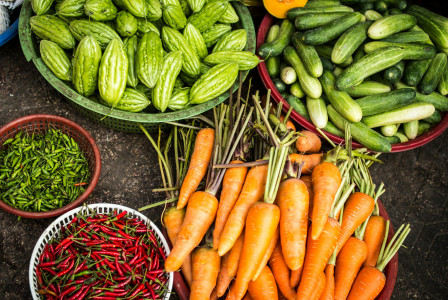Best practices
12 June 2025
Transforming Local Food Systems: La Ceinture Alimentaire Charleroi Métropole (CACM)
Best practices
12 June 2025
Regenerative Green Transition
Proximity and social economy
Agri-food
+10 more
-
10

La Ceinture Alimentaire Charleroi Métropole (CACM) is a territorial facilitator aiming to drive a collective transformation towards a resilient, sustainable, and inclusive local food system in the Charleroi region. Rooted in the principles of the social and solidarity economy, CACM brings together stakeholders across the food supply chain to promote healthy, local, and fair food for all. From its governance model to infrastructure projects like the logistics hub and Carolostore, CACM champions short supply chains, local collaboration, and equitable access to nutritious food.
Topics
Belgium
SMEs (a company with less than 250 employees)
Social Economy Entity
-
Thematic area
-
-
Regenerative Green Transition
-
-
Interlinkages with other sectors
-
-
Proximity and social economy
-
Agri-food
-
-
Action areas and keywords
-
-
Access to technology
-
Boosting digital skills by - and in the social economy
-
Circular Economy
-
Creating financial incentives and supportive regulation for green and circular social economy business models
-
Innovation
-
Innovation as enabler for green transition and business development in the social economy
-
Supporting Digital Social Innovation & Tech for Good entrepreneurship
-
-
Ecosystem focus
-
-
Social economy
-
-
Scope of activity
-
-
Local/neighbourhood
-
Regional
-
Share
La Ceinture Alimentaire Charleroi Métropole (CACM) serves as a key player in the region’s transition towards a sustainable and inclusive food system. Based in Charleroi and hosted by the social economy federation SAW-B, CACM operates within a network of 30 municipalities to help build a territory that can feed its population with healthy, locally produced food that respects people and the planet.
Through its initiatives, CACM integrates core principles of the social and solidarity economy, such as cooperation, inclusiveness, and shared governance. It actively involves producers, distributors, local authorities, community organisations, and citizens in reshaping the region’s food landscape.
Among its flagship projects:
The Logistics Hub (launching in June 2025): A 2,000 m² facility for local food storage, processing, and distribution. It will include a vegetable processing unit, transformation workshop, sales desk, and dispatching service to supply public institutions and food professionals.
Carolostore: A retail outlet responding to a need identified in participatory forums, offering fair-priced local produce from regional farmers and artisans.
Food Policy Council (CPA): A local governance body comprising stakeholders across the food system. It defines priorities and strategies to strengthen Charleroi’s food resilience.
At the heart of CACM’s strategy is territorial animation, bringing stakeholders together to co-create sustainable food solutions. The organisation works through six interconnected missions:
- Territorial Animation – Coordinating food system actors.
- Information & Guidance – Acting as a reference for short food supply chains.
- Structuring Local Supply Chains – Developing and supporting short circuit and social economy initiatives.
- Awareness Raising – Educating producers, consumers, and food system stakeholders.
- Knowledge Sharing – Documenting and disseminating experiences.
- Advocacy – Advising and challenging public authorities.
The Food Policy Council (CPA) defines the direction of CACM’s work. In its December 2024 plenary, members established four working groups for 2025:
- GT1: Access and Food Inclusion – Developing solutions to make sustainable food accessible to all, especially vulnerable groups and children.
- GT2: Local Supply Chains – Strengthening robust, localised food production and distribution networks.
- GT3: Communication and Awareness – Promoting sustainable food and engaging regional stakeholders.
- GT4: Territorial Analysis and Innovation – Enhancing understanding of the local food system and identifying scalable best practices.
CACM’s work demonstrates how regional collaboration, supported by social economy values, can build food sovereignty, regenerate abandoned land, and contribute to a healthier, fairer society. In partnership with SAW-B, CACM reinforces the socio-economic fabric of the Charleroi region—turning food into a vector for resilience, inclusion, and community-led change.
Comments (0)
See also
Abacus: Education and Culture as Drivers of Social Change
- Categories
- Partnerships Regenerative Green Transition Skills +30 more
Orto 2.0: A Digital Urban Farming Platform Reviving Land and Communities
- Categories
- Transformative Digital Transition Proximity and social economy Agri-food +17 more
Cadore – Dolomiti s.c.s.: Building Inclusive Work in the Heart of the Dolomites
- Categories
- Regenerative Green Transition Skills Urban and Rural Wellbeing +25 more




